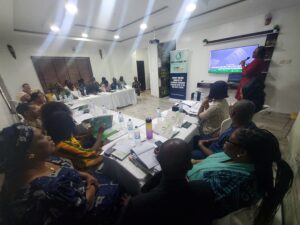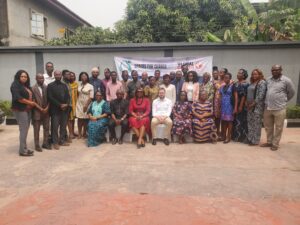On February 9, Spaces for Change | S4C, in collaboration with the Special Control Unit Against Money Laundering (SCUML), co-hosted a post-national risk assessment (NRA) workshop in Lagos to disseminate the findings of the Terrorism Financing Risk Assessment (TFRA) of the NPO sector and to equip non-profit organizations (NPOs) operating in the South-West region of Nigeria with the knowledge and resources for combating terrorist financing (ML/TF) risks in charitable entities. In attendance were executive directors, finance controllers, administrative and program officers from 30 NPOs.
SCUML, with technical expertise from Spaces for Change, conducted the TFRA in 2022. The TFRA identified NPOs operating in the South-West region of Nigeria as having a low-risk profile for terrorism financing (TF) abuse because of the absence of terrorist activities and fewer humanitarian interventions in the region. Despite having a low terrorist financing risk profile, countries are obligated to carry out an enhanced outreach on terrorist financing abuse to NPOs identified as vulnerable, including those with low risk. This is a requirement of the global intergovernmental body that sets the global standards for combating money laundering and terrorism financing (ML/TF) called the Financial Action Task Force (FATF) under its revised Recommendation 8 and the Best Practice Paper (BPP).
The participants learned about the findings of the TFRA, specifically the 10 categories of NPOs that fall within the FATF R8’s definition of NPO. They include expressive NPOs, service-provision NPOs, humanitarian organizations, and donor bodies, among others. The TFRA found that geography is a major determinant of the vulnerability of NPOs to TF abuse. Along this line, NPOs operating in high-risk jurisdictions where terrorists operate are exposed to a higher risk of terrorist financing abuse. The TFRA also listed 10 features and types of NPOs which by virtue of their activities or characteristics, are likely to be at risk of terrorist financing abuse. These subsets of NPOs are predominantly in the north-east and north-western regions of the country where insurgency and terrorist activities are rife.
Under the Terrorism (Prevention and Prohibition) Act, 2022, terrorism financing refers to any form of support to terrorist or terrorist groups whether financially or otherwise, with the intention to support terrorist activity. This means that terrorism financing has gone beyond just giving financial support, but encompasses other forms of support such as providing service, property, funds, or other forms of assistance to terrorist groups. Accordingly, the participants were trained on how to mitigate money laundering and terrorism financing (ML/TF) risks, highlighting some of the ways NPOs can be misused for ML/TF. For instance, NPOs can be knowingly or unknowingly exploited and used as vehicles for delivering services to members of a terrorist sect. NPOs can counter such deceptive tactics by having strong internal controls and implementing tailored risk management strategies to enhance compliance with anti-terrorism financing regulations.
There have been several initiatives to mitigate TF or abuse put together nationally and at the international level. These initiatives include the development of tools, databases, and portals that assist organizations, institutions, and individuals in vetting potential partners, affiliates, employees, vendors, and donors for terrorism financing risk or affiliation with any terrorist or terrorist groups. Among these tools, the one most recognized by the Nigerian government is the United Nations Security Council Sanctions List and the Nigeria Sanctions List developed by the Nigerian Sanctions Committee. Through practical exercises, NPOs were taught how to conduct sanctions screening to prevent having any financial transactions with sanctioned individuals or designated entities.
By addressing key topics such as combating money laundering, mitigating terrorism financing risks, and conducting sanction screening, participants gained essential knowledge and skills to safeguard their organizations against financial crimes and contribute to the overall integrity of the NPO sector. About 97% of the participants acknowledged that they were just hearing about NPOs’ risk exposure to money laundering and terrorism financing for the first time. The workshop not only changed perspectives but also helped them gain new skills for safeguarding against TF abuse. The workshop was supported by the Global Center on Cooperative Security (GCCS).






















